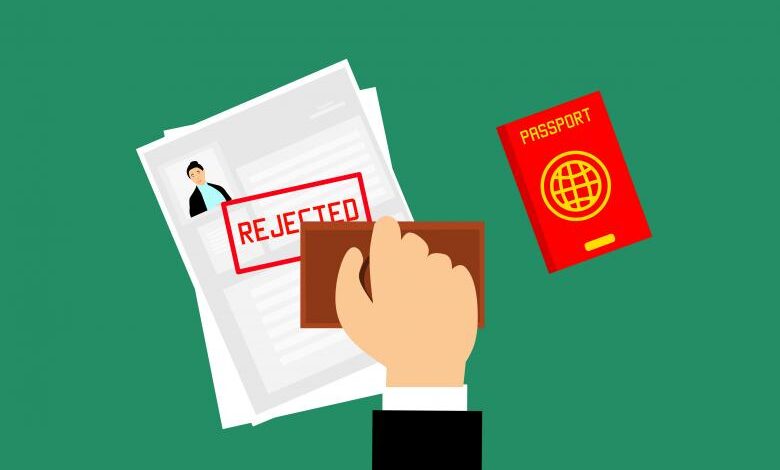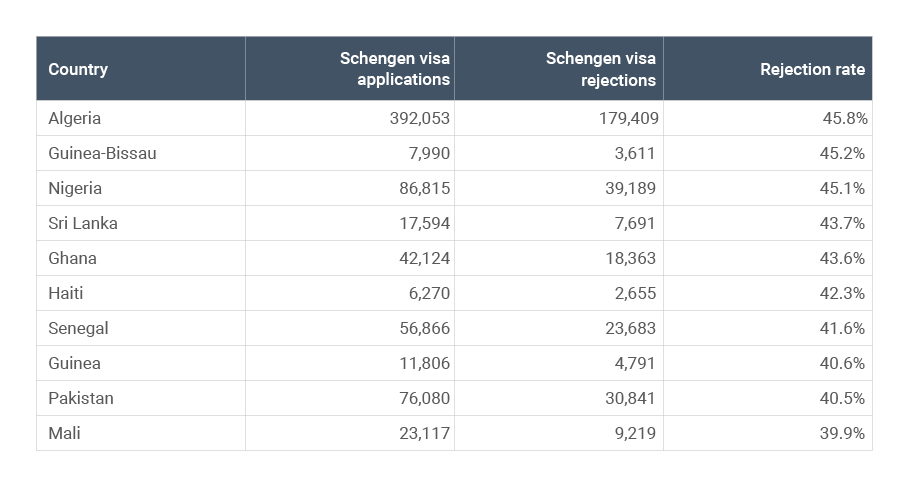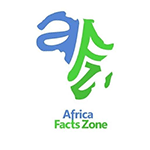African Countries Facing the Highest Visa Rejection Rates

The journey to obtain a Schengen visa, which grants access to 26 European countries, has become increasingly challenging over the years, especially for African applicants.
Recent trends show a troubling increase in rejection rates for Africans compared to global averages, highlighting a deeper issue in international travel and relations.
This disparity not only affects individuals but also reflects broader geopolitical and economic implications between Africa and Europe.
The Harsh Reality: Disproportionate Rejection Rates
Global vs. African Rejection Rates
While the overall number of Schengen visa applications has decreased globally, the rejection rate for these applications has surged.
In 2023, the global rejection rate climbed to 17.5%, a stark increase from previous years. For African applicants, this situation is even grimmer, with a rejection rate of 30%—nearly double the global average.
Countries like Algeria, Guinea-Bissau, and Nigeria face rejection rates upwards of 45%, indicating a severe discrepancy in the treatment of applicants based on their geographic origin.
Specific Cases of High Rejection
African countries dominate the list of highest Schengen visa rejections:
- Algeria: 45.8%
- Guinea-Bissau: 45.2%
- Nigeria: 45.1%
In stark contrast, applicants from the US, Canada, and the UK face significantly lower rejection rates, showcasing a bias that favors economically stronger and Western countries.

Underlying Factors: Why the High Rejection Rates?
Economic and Passport Power
The link between a country’s economic standing and the strength of its passport is undeniable. African nations, with lower gross national incomes per capita, often find themselves at the lower end of the Henley Passport Index.
This index measures global travel freedom, and unfortunately, a weaker passport translates to higher chances of visa rejection.
Also Read: Golden Visas: 4 African Countries Offering Golden Visa Opportunities
The Overstay Myth
European authorities often justify high rejection rates with the risk of visa overstays. However, the data does not support this claim universally.
For instance, Malta, with one of the highest rejection rates at 35.5%, reported only 750 unauthorized stays—a figure that hardly justifies the high number of refusals.
This discrepancy suggests that factors other than actual risk are at play, possibly including geopolitical strategies and migration control tactics.
The Impact: More Than Just Missed Opportunities
The high rejection rates for African Schengen visa applicants represent more than just lost travel opportunities.
They reflect deeper issues of inequality and restricted mobility that affect not only individuals but also the broader economic and cultural exchanges between Africa and Europe.
Economic Implications
Each rejected visa application represents a potential economic opportunity lost. Business exchanges, academic collaborations, and tourism ventures are hindered, affecting economic growth and international relations.
Cultural and Personal Impact
On a more personal level, these rejections can mean missed family gatherings, educational opportunities, and significant life events. The psychological impact of such rejections can also not be understated, contributing to feelings of exclusion and discrimination.
Solutions and Moving Forward
Addressing the high rejection rates requires a multi-faceted approach:
- Policy Reevaluation: European visa policies need a thorough reevaluation to ensure fairness and non-discrimination.
- Transparency in Visa Decisions: Increasing transparency about the reasons for visa rejections could help reduce misunderstandings and improve the application process.
- Strengthening Diplomatic Ties: Enhanced dialogue and cooperation between African nations and the EU could lead to more favorable visa arrangements.
Conclusion: A Call for Change
The disparity in Schengen visa rejection rates calls for a critical reevaluation of visa policies and practices.
By addressing these disparities, Europe can demonstrate a genuine commitment to fostering better international relations and equal opportunities for global mobility.
Frequently Asked Questions About Schengen Visa Rejections
- Why are African applicants more likely to get their Schengen visa rejected?
- Economic factors, perceived overstay risks, and weaker passports are among the reasons for higher rejection rates among African applicants.
- What can applicants do to increase their chances of visa approval?
- Providing clear and comprehensive documentation, following application guidelines meticulously, and ensuring the purpose of the visit is well articulated can help improve chances of approval.
- Are there any countries in Africa with low rejection rates?
- Yes, countries like Seychelles, Mauritius, South Africa, Botswana, and Namibia generally have lower rejection rates.
- How does the visa rejection rate affect business between Africa and Europe?
- High rejection rates can hinder business interactions, preventing economic opportunities and partnerships.
- Can improving economic conditions in African countries reduce visa rejections?
- Potentially, as economic improvements might lead to stronger passports and lower perceived risks by European countries.





